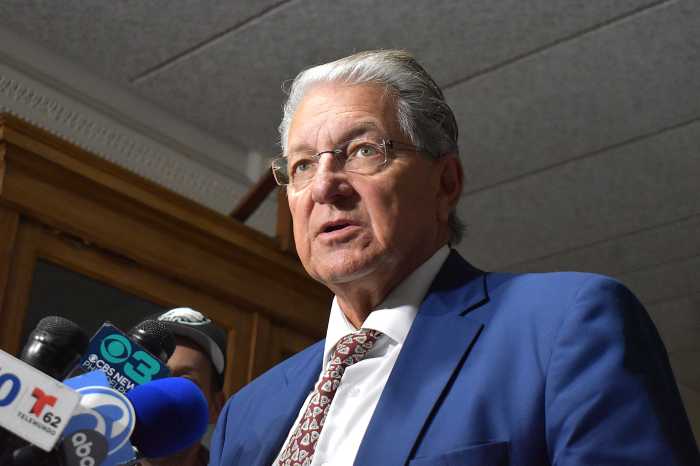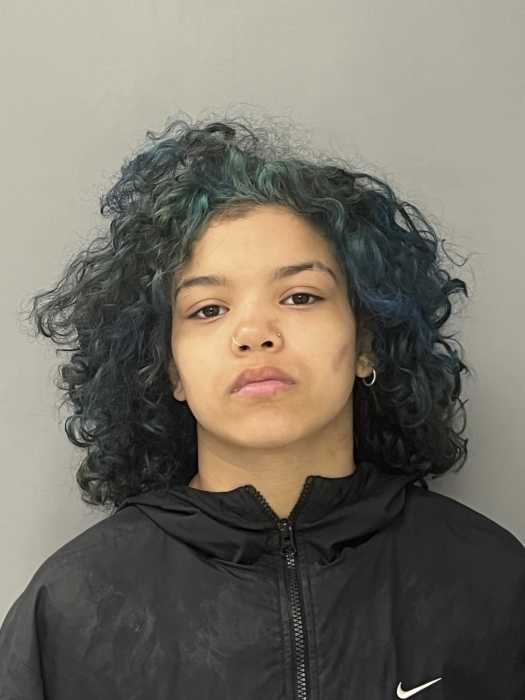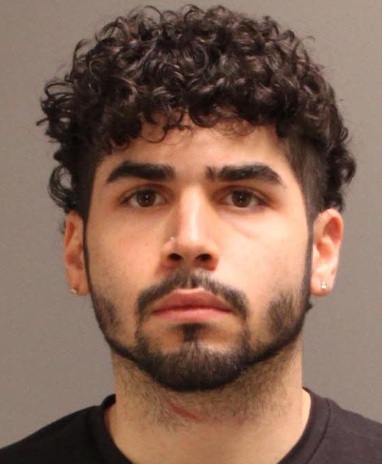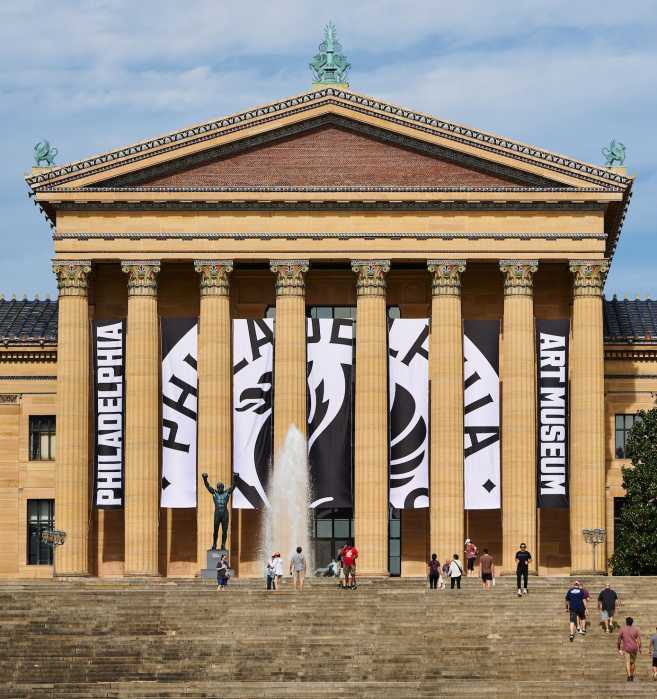On Aug. 11, Philadelphia Managing Director Tumar Alexander told a crowded auditorium at Lewis Elkins Elementary School the city prefers a service approach to encampment resolutions — government parlance for encampment sweeps. The police don’t beat up or kick people out.
But according to ACT UP Philadelphia’s Jamaal Henderson, police swarmed Kensington last Wednesday during a planned sweep of two encampments. With large areas cordoned off from public view, they only later learned that many of the people experiencing homelessness had their belongings thrown in the trash that morning.
“You’ve got people that are already experiencing homelessness, already feel like the city just doesn’t care about them,” Henderson said. “Then they have to go through the trauma of repeatedly having what little bit of stuff that they can have thrown away.”
About 10 years ago, ACT UP, the AIDS Coalition to Unleash Power, turned its attention to Philadelphia’s housing crisis to tackle the city’s HIV epidemic. Affordable housing is a crucial impediment to managing and preventing HIV for many low-income persons, especially Black transgender and gender-nonconforming people of color — communities where HIV rates are rising. So ACT UP took to the streets in peaceful protest to spur the city into action.
The campaign to ‘Air Mayor Kenney’s Dirty Laundry’ charges Philadelphia’s top politicians with mismanaging the housing crisis and favoring for-profit developers over low-income and unsheltered residents. ACT UP argues that initiatives like the Housing Trust Fund and Low Income Housing Tax Credits benefit those who need them the least. Meanwhile, the group said, the Philadelphia Housing Authority sells off viable homes to develop domiciles unsuitable for families.
Activists accuse the mayor of abdicating responsibility. In a 2018 housing equity plan, Kenney proposed over 100,000 housing opportunities within 10 years. According to ACT UP’s Max Ray-Riek, the mayor didn’t fail to meet his goals.
He didn’t try.
Ray-Riek explained that the mayor made cuts or attempted cuts to the Office of Homeless Services and the Housing Trust Fund as the eviction crisis looms.
“You have the opioid crisis,” Ray-Riek said. “You have COVID, making it particularly unsafe when people are doubled up and living in more crowded conditions.”
“And you have the ongoing HIV crisis,” he continued. “We have to air that dirty laundry.”
A city spokesperson told the Metro that the city shares ACT UP’s concerns, highlighting a $100 million investment in COVID-related rental assistance and the Philadelphia Eviction Prevention Program. Any homelessness is too much, the spokesperson said, noting that OHS has a “housing-first” approach — a statement that Henderson, Ray-Riek, and others in the housing community argue is not true.
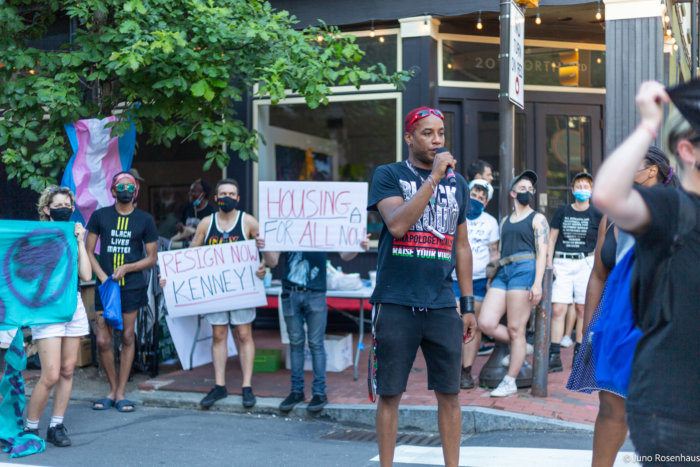
“Philadelphia continues to have the lowest number of people experiencing street homelessness of any major American city — as of 2020, we have reduced chronic street homelessness by 12%,” the city spokesperson said. “And we’ve reduced family homelessness in Philadelphia by 25% since 2017. Despite unprecedented pressures from a widening wealth gap, lack of affordable housing, and the opioid crisis, Philadelphia continues to remain ahead of the curve in providing effective and compassionate solutions to homelessness.”
In addition, the spokesperson shared several other statistics, mentioning the city’s network of 60 providers and a less than 3% known COVID infection rate in shelters over the past year.
Yet organizers want the mayor to stop saying that homelessness fell in Philadelphia, as research shows unsheltered populations are undercounted.
“I swear he’s cherry-picking some really careful statistics,” Ray-Riek said.
To push the point, ACT UP held a series of peaceful demonstrations outside Kenney’s Center City home. They brought a list of demands — end all evictions, reopen COVID hotels, and replace the leadership at OHS, among others — hoping to spark a conversation. The protests had a festive atmosphere, such as a dance party during Pride, to celebrate the leadership of queer people and people with HIV fighting to end homelessness.
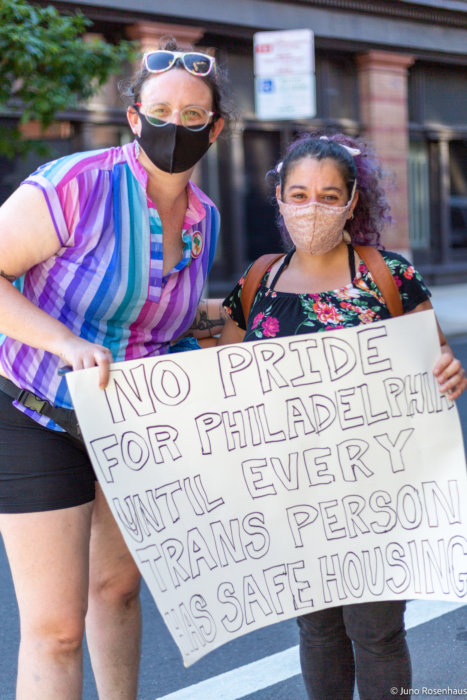
But a barbecue outside the mayor’s house in July turned violent when police arrived, sending at least five organizers to the hospital. According to Jamaal Henderson, it’s been months since ACT UP sat down with city officials, with the last meeting ending in frustration.
“I feel like the people in the administration, the people in power right now, feel like we shouldn’t be questioning them because they know better,” they said.
Genuine housing first policies can lift people out of poverty, prevent fatal overdoses, and help manage HIV. However, according to ACT UP, Philadelphia’s model comes up short on trauma-informed care, from shelters penalizing people for minor infractions to the city’s smoking ban in treatment centers to the way encampment sweeps — resolutions — tear down the safety that comes from a community.
“We have been telling the city, specifically [OHS] how harmful these evictions are for years,” harm reductionist and ACT UP organizer Adrienne Standley said. “And I haven’t seen the city change almost anything.”
And until the city does change, ACT UP says they will continue to air Mayor Kenney’s dirty laundry.




